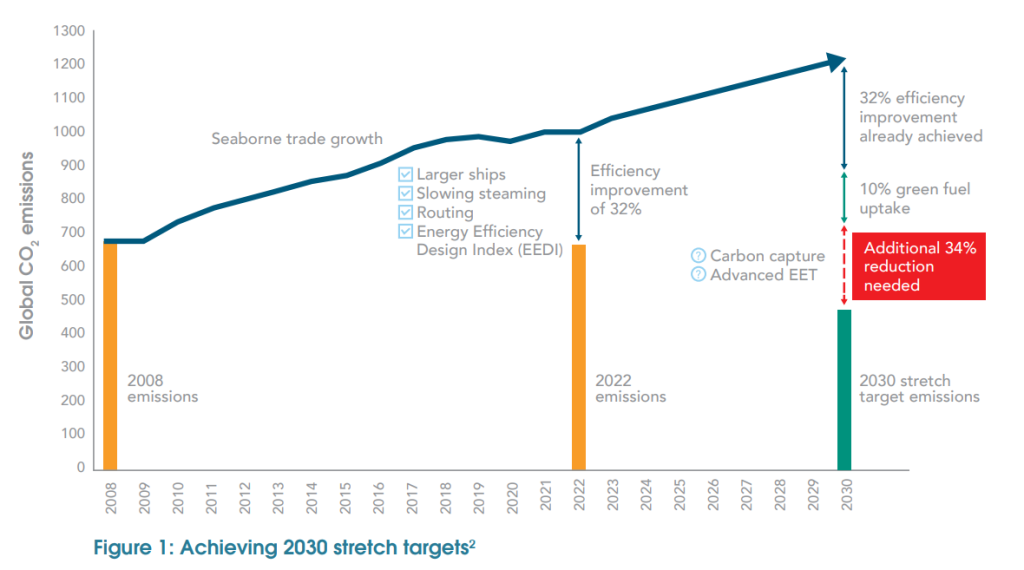First published on Safety4Sea

Credit: Shutterstock/Image used for illustrational purposes only
According to the Global Centre for Maritime Decarbonisation (GCMD), improving energy efficiency stands out as a no-regrets strategy in the pursuit of minimizing fuel consumption and alleviating associated costs.
As GCMD notes in their latest white paper “Pay-As-You-Save: Closing the data-financing gap to turbocharge maritime Energy Efficiency Technologies (EET) retrofits”, in the realm of shipping, where green fuels face limitations in availability, exhibit lower volumetric energy densities compared to conventional fossil fuels, and command substantial premiums, the emphasis on reducing fuel usage of any kind becomes paramount in achieving industry-wide decarbonization objectives.
From 2008 to 2022, the industry achieved a commendable 32% gain in energy efficiency, leveraging both technical mechanisms, such as employing larger and more efficient ships, and operational strategies, including slow steaming and optimized routing. Despite these advancements, the absolute emissions from shipping have not witnessed a significant decrease, given the concurrent rise in seaborne trade during this period, the paper highlights.
The volume of seaborne trade is anticipated to grow at a rate of 2-3% year-over-year until 2030. Simultaneously, the International Maritime Organization (IMO) has set a target of reducing emissions by 20-30% relative to 2008 levels within the same timeframe. This equates to a necessity to reduce emissions by 76% compared to the business-as-usual scenario in 2030.

Meeting this ambitious target poses a formidable challenge, even considering the 32% efficiency improvement already achieved by the sector. Even if the industry can implement a 10% adoption of green fuels to further curtail emissions, there remains a substantial burden of emissions reduction to fulfill the IMO’s ambitious 2030 stretch target. According to GCMD, the industry can contend that this gap can be bridged through the widespread deployment of Energy Efficiency Technologies (EETs).
Pay-As-You-Save (PAYS)
As explained in the White Paper, PAYS stands out as a financing model with a proven track record in various sectors, effectively accelerating the adoption of energy efficiency solutions. In this model, building owners gain the flexibility to install energy-efficient upgrades without the need for substantial upfront investment.
The investment responsibility is shouldered by a third party, such as a financier or energy service provider. The payback to the financier is then spread over time and directly linked to the realized energy savings.
This dynamic creates a shared risk and reward model, with the building owner, tenant, and financier all benefiting from reduced energy consumption and carbon emissions. Simultaneously, this approach contributes to an increase in the overall value of the building.
How PAYS works and its potential to spur EET adoption
For PAYS to be effectively applied in the maritime sector, a complete solution built on a shared risk approach is critical, one on which multi-party collaboration agreements among partners that span the entire value chain has to be developed.
In the GCMD-BCG survey, more than 50% of the survey respondents indicated PAYS as a viable pathway to encourage broader adoption of EETs.
As the report specifies, to specifically enable PAYS in the maritime sector, three types of collaborative agreements must come together, namely agreements that specify the terms for technology installation, data validation, and data-driven financing. The White Paper also suggests the following:
Technology Installation Agreement
One critical element that can enable broader Energy Efficiency Technologies (EET) adoption is an accurate evaluation of the technology’s true impact on fuel savings. Robust data collection and analysis for this purpose are crucial. A collaborative agreement between the EET solution provider, the shipyard responsible for installing the technology, and the shipowner can facilitate this process.

Data Validation Agreement
Facilitating transparent sharing of real-world validated performance data is crucial for financing and charter party agreements. A secure data platform could play an instrumental role in storing, processing, and analyzing EET performance data under scenarios that either account for or isolate external variables that can impact its performance.
Underpinning the platform’s effectiveness is a data validation agreement between stakeholders, including the EET solution provider, the shipowner and operator, data verifier, communications provider, and the data platform architect. This agreement establishes processes to ensure secure data collection and authenticate data provenance. It should also specify the data repository platform.
Data-Driven Financing Agreement
Legal frameworks for ship financing today typically prioritize the senior mortgage holder’s interests, disincentivizing other stakeholders to make investments for EET installation given the risk of default or the resources required to develop these complex legal agreements.
New contractual structures should be developed to balance stakeholder interests while keeping financing affordable. Such structures require financing mechanisms that can facilitate equitable sharing of risks at the initial CAPEX investment stage and sharing of fuel savings revenue downstream.
A data-driven financing agreement, between financiers, insurers, charterers, vessel owners, and the data architects, can establish a clear link between financing and data quality standards.



